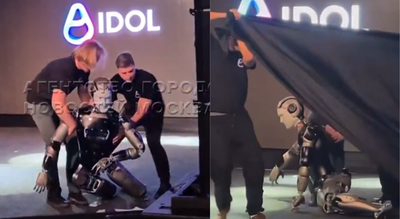Russia’s first artificial intelligence-powered humanoid robot made its public debut in Moscow this week, and promptly met the floor. The robot, named AIdol, had barely taken its first cautious steps on stage before it lost balance and fell face-first, prompting gasps, laughter, and a viral video moment that Moscow’s tech scene won’t soon forget. The incident unfolded on 10 November during a technology showcase at the Yarovit Hall Congress Centre in Moscow. Set to the triumphant soundtrack from the film Rocky, AIdol walked gingerly across the stage, waved to the audience, and immediately toppled forward. Staff rushed in to help as pieces scattered on the floor and the curtain was swiftly drawn to shield the fallen star from view.
A lesson in balance, and humility
Developed by the Russian robotics firm Idol, the robot is being presented as a milestone in domestic AI innovation. Vladimir Vitukhin, the company’s CEO, described the episode as part of the process. “This is real-time learning, when a good mistake turns into knowledge, and a bad mistake turns into experience,” he said during the presentation, as per Newsweek. Vitukhin attributed the fall to calibration issues, emphasising that AIdol is still in its testing phase. The robot was temporarily removed from public view for engineers to inspect its balance systems and control software. Despite the awkward debut, Idol maintains that AIdol represents significant progress in embodied artificial intelligence — an effort to create machines that move, manipulate objects, and interact with people in more human-like ways. The company says the robot integrates movement control, emotion modelling, and interactive dialogue capabilities, relying largely on Russian-made components.
Inside AIdol: built (mostly) in Russia
Underneath the silicone exterior, AIdol runs on a 48-volt battery that delivers up to six hours of continuous operation. About 77 percent of its components are produced domestically, a figure Idol aims to increase to 93 percent in future versions. The robot is equipped with 19 servomotors, enabling it to display more than a dozen basic emotions and hundreds of micro-expressions. Its skin, made of layered silicone, is designed to replicate subtle variations in human facial movement. “The robot can smile, think, and be surprised, just like a person,” Vitukhin said. The company’s presentation positioned AIdol as an example of Russia’s ambition to join the global race for advanced humanoid robotics, a field dominated by the likes of the US and Japan. However, the dramatic debut instead ignited online debate about whether Russia’s robotics industry is ready to compete on that stage.
The internet reacts, and chuckles
Unsurprisingly, social media had its fun. Videos of AIdol’s tumble quickly spread, with users alternately mocking and defending the effort. One quipped, “They did a great job of emulating the shuffle of a geriatric that’s had too much vodka.” Another observed, “It looks like they already knew their mechanical dude would tumble.” There were also words of encouragement amid the jokes. “Robotics is hard. I am glad to see bold entrepreneurs from other countries are stepping up. It’s always challenging to try. It’s easy to fail. And failing publicly humbles you, which fuels the true entrepreneurs to keep going, keep trying,” wrote one commenter. Others leaned into classic Russian humour:
- “Probably was — it is a Russian robot, after all. Runs on vodka.”
- “I recognise that face! Just another night fuelled by vodka”
- “I’m not impressed. I did the same showing up to my birthday dinner after a 4-tequila-shot happy hour. Do better, robots.”
Still, the episode earned AIdol a level of fame most robots can only code for. As one commenter put it: “These are the days we will look back on and smile. When the droids were children and we were still naïve.”
A moment in the global robotics race
The Moscow mishap arrives as humanoid robotics continues to capture global attention. Just days earlier in Texas, Elon Musk celebrated a nearly $1 trillion pay package by dancing on stage alongside Tesla’s Optimus robot during the company’s annual general meeting in Austin. AIdol’s stumble, while less choreographed, still marks an important moment in Russia’s technological ambitions. Idol’s engineers insist that every fall is part of the journey toward refinement, and in this case, a very public lesson in balance, both mechanical and metaphorical. For now, the first Russian AI humanoid has proven one thing with certainty: learning to walk, whether for humans or machines, is rarely graceful the first time around. Go to Source



